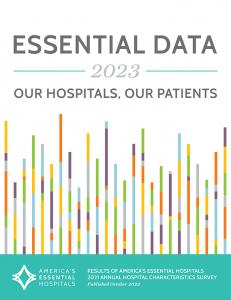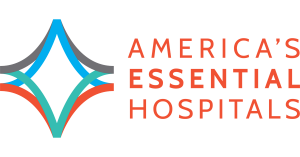New Data Illustrate Essential Hospitals’ Severe Financial Challenges
Annual snapshot shows these safety net providers accounted for more than a quarter of the nation's charity care but represented just 5 percent of all hospitals.
These data show how the added pressure of the pandemic deepened long-standing financial challenges for our hospitals.”
WASHINGTON, DC, UNITED STATES, October 12, 2023 /EINPresswire.com/ -- Essential hospitals, more than 300 of the nation’s largest safety net providers and about 5 percent of all U.S. acute-care hospitals, provided more than a quarter of all charity care nationally in 2021, a new report from America’s Essential Hospitals shows.— Beth Feldpush, DrPH
The report, Essential Data 2023: Our Hospitals, Our Patients, also shows that charity care and other uncompensated care left essential hospitals in the red, with an average operating margin of −8.6 percent compared with −1.4 percent for all other hospitals, based on Medicare cost report data.
“These data show how the added pressure of the pandemic deepened long-standing financial challenges for our hospitals, including public payer shortfalls and the high uncompensated costs of their safety net mission,” said Beth Feldpush, DrPH, senior vice president of policy and advocacy for America’s Essential Hospitals. “Those challenges remain today and underscore the urgency of stopping cuts to key federal safety net support.”
Medicaid disproportionate share hospital (DSH) funding is set for an $8 billion cut in mid-November, when the current stopgap government funding measure expires. This amount, two-thirds of all federal DSH dollars, would devastate essential hospitals, Feldpush says.
“They simply cannot sustain a cut of that magnitude,” she says. “Access to care and lifesaving services will suffer unless Congress acts.”
The association’s latest data report, a snapshot of its members, shows that people from underrepresented racial and ethnic groups constituted about 55 percent of member discharges in 2021 and nearly three-quarters were uninsured or covered by Medicaid or Medicare. The report also illustrates the socioeconomic status of essential hospitals’ communities, where 5.4 million people had limited access to healthful food, 237,000 experienced homelessness, 10 million had no health insurance, and 14.6 million lived below the poverty line in 2021.
“Essential hospitals are on the front lines of work to address social and economic factors that drive poor health,” Feldpush said. “They understand that health—good and bad—begins outside their walls, in the community.”
Essential hospitals extend their reach with a median of 16 on- and off-campus ambulatory care centers per hospital, including rural health clinics and federally qualified health centers. These networks, which bring care to historically underserved people, would suffer under legislative proposals that disregard the added costs hospitals sustain to operate clinics, Feldpush says.
In addition to their core role of caring for marginalized populations, essential hospitals provide communities at large with complex, lifesaving services and contribute significantly to local and state economies. In 2021, essential hospitals:
-- Operated about a third of the nation’s level I trauma centers, nearly 45 percent of burn care beds, and more than a quarter of the nation’s pediatric intensive care beds.
-- Trained an average of 246 physicians per teaching hospital versus 69 at other teaching hospitals.
-- Employed more than 3,700 people per hospital and contributed more than $321 billion in economic activity to state economies.
Essential Data 2023: Our Hospitals, Our Patients, is available from America’s Essential Hospitals, at essentialdata.info.
# # #
About America’s Essential Hospitals
America’s Essential Hospitals is the leading association and champion for hospitals dedicated to equitable, high-quality care for all, including those who face social and financial barriers to care. Since 1981, America’s Essential Hospitals has advanced policies and programs that promote health, health care access, and equity. We support our more than 300 members with advocacy, policy development, research, education, and leadership development. Communities depend on essential hospitals for care across the continuum, health care workforce training, research, public health and health equity, and other services. Essential hospitals innovate and adapt to lead all of health care toward better outcomes and value. Learn more at https://essentialhospitals.org.
Contact:
Carl Graziano
cgraziano@essentialhospitals.org
202.585.0102
Carl Graziano
America's Essential Hospitals
+1 202-585-0102
email us here
Legal Disclaimer:
EIN Presswire provides this news content "as is" without warranty of any kind. We do not accept any responsibility or liability for the accuracy, content, images, videos, licenses, completeness, legality, or reliability of the information contained in this article. If you have any complaints or copyright issues related to this article, kindly contact the author above.


